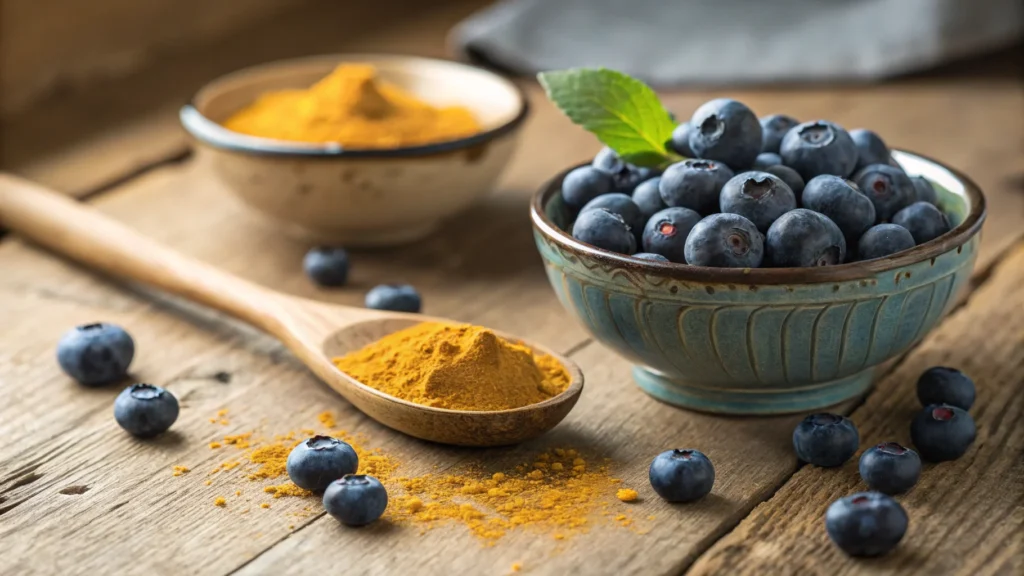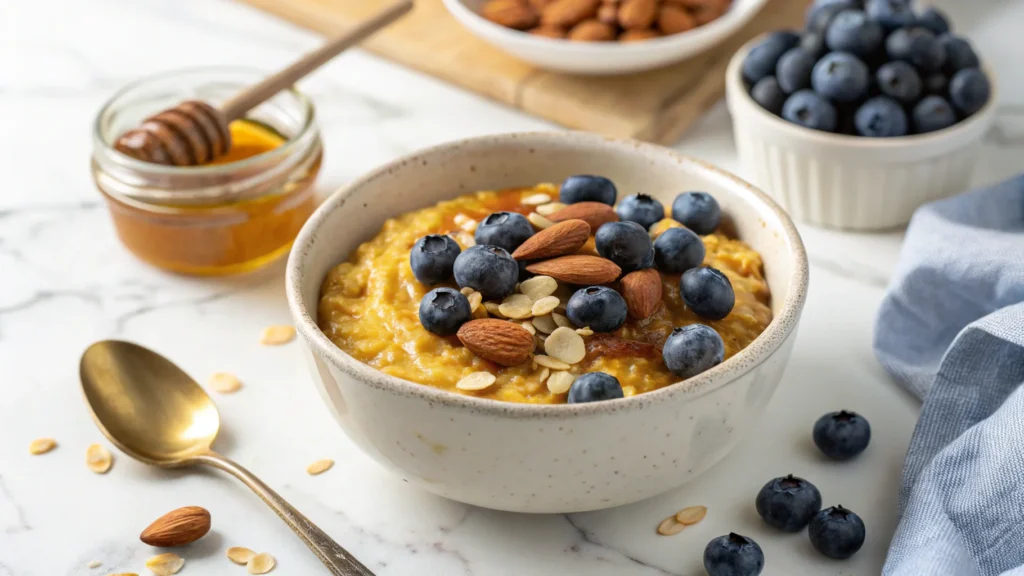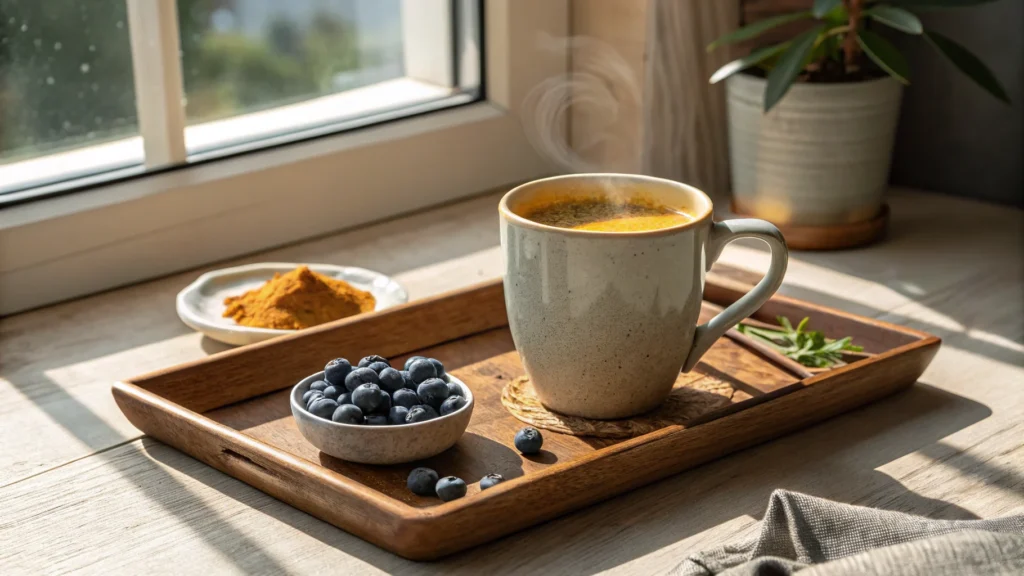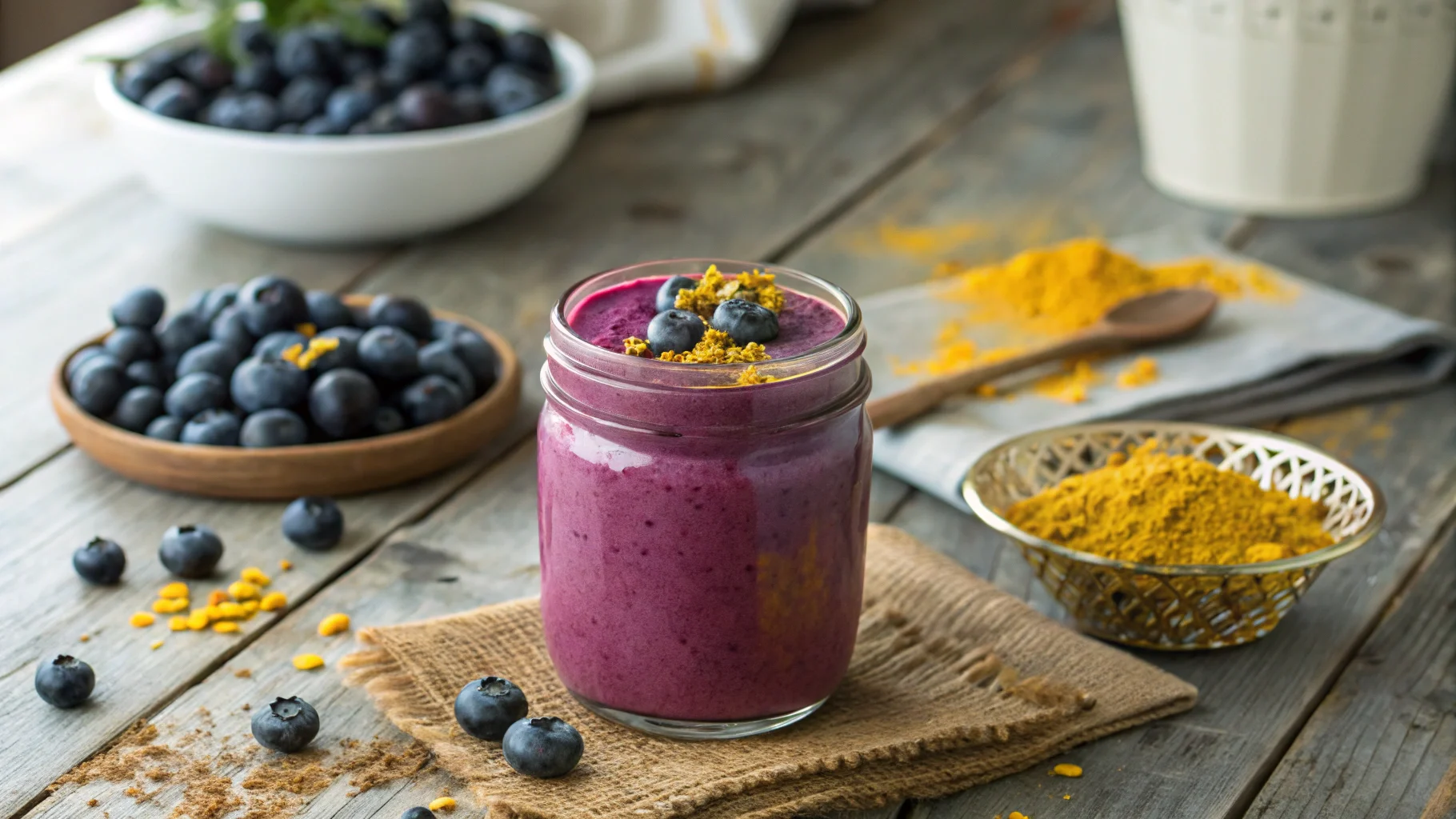Blueberries and turmeric—two superfoods packed with powerful antioxidants and health benefits. But do blueberries and turmeric go together? Can their distinct flavors and nutrients work in harmony?
In this guide, we’ll dive deep into the science behind these ingredients, explore their combined health benefits, and share delicious ways to enjoy them together. Whether you’re looking for a brain-boosting smoothie or an anti-inflammatory tea, you’ll discover how to make the most of this superfood duo.
Table of contents
- Introduction to Blueberries and Turmeric
- The Science Behind Blueberries and Turmeric
- Flavor Profile – Do Blueberries and Turmeric Taste Good Together?
- Health Benefits of Combining Blueberries and Turmeric
- How to Use Blueberries and Turmeric Together
- Blueberry and Turmeric Recipes to Try
- Common Questions About Blueberries and Turmeric
- Conclusion – Should You Add Blueberries and Turmeric to Your Diet?
Introduction to Blueberries and Turmeric
Blueberries and turmeric are both known for their impressive nutritional profiles. While blueberries are rich in anthocyanins, which give them their deep blue color and antioxidant power, turmeric contains curcumin, the compound responsible for its golden hue and anti-inflammatory benefits.
But why are people suddenly interested in combining them? Let’s break it down.
The Growing Popularity of Superfoods
In recent years, the term superfoods has taken over the health and wellness world. People are always looking for natural ways to boost immunity, fight inflammation, and improve brain function. Blueberries and turmeric have been individually recognized as nutritional powerhouses, but their potential synergy has only recently gained attention.
Overview of Blueberries: Nutritional Benefits and Key Compounds
Blueberries are one of the most nutrient-dense fruits, loaded with vitamins, minerals, and antioxidants. Their key benefits include:
- High in vitamin C and vitamin K, essential for immune support and bone health.
- Rich in fiber, aiding digestion and promoting gut health.
- Packed with anthocyanins, which help fight oxidative stress and support brain function.
- Known for improving heart health and regulating blood sugar levels.
Overview of Turmeric: Curcumin and Its Health Properties
Turmeric, widely used in traditional medicine, has gained scientific backing for its extraordinary benefits. The main compound, curcumin, is what makes turmeric a true superfood. It offers:
- Anti-inflammatory properties that may help with arthritis, joint pain, and chronic conditions.
- Antioxidants that combat free radicals and protect cells from damage.
- Cognitive benefits, with research suggesting curcumin may support memory and reduce the risk of neurodegenerative diseases.
- Digestive support, aiding gut health and reducing bloating.
Why People Are Curious About Combining These Two Ingredients
With both foods offering powerful health advantages, many wonder if combining blueberries and turmeric could enhance their benefits. Some early research suggests that consuming curcumin with antioxidant-rich foods like blueberries could improve bioavailability—the body’s ability to absorb and use the nutrients effectively.

The Science Behind Blueberries and Turmeric
Blueberries and turmeric are both known for their impressive health benefits, but do blueberries and turmeric go together in a way that enhances their effects? The answer lies in their unique compounds and how they interact with the body. Scientists have been studying how antioxidants and anti-inflammatory agents work together, and the results are promising.
Antioxidants in Blueberries: Anthocyanins and Their Effects
Blueberries owe their deep blue color to anthocyanins, a type of antioxidant known for fighting oxidative stress. These powerful compounds:
- Protect cells from damage caused by free radicals.
- Support brain function by enhancing memory and cognitive performance.
- Improve heart health by reducing bad cholesterol and supporting healthy blood vessels.
Because oxidative stress plays a role in aging and many chronic diseases, consuming foods rich in antioxidants—like blueberries—is essential for overall well-being.
Anti-Inflammatory Properties of Turmeric: The Role of Curcumin
Turmeric’s golden color comes from curcumin, a compound known for its strong anti-inflammatory properties. It helps by:
- Reducing chronic inflammation, which is linked to diseases like arthritis and heart disease.
- Supporting immune function, helping the body fight infections naturally.
- Enhancing gut health, reducing bloating, and aiding digestion.
However, there’s a catch—curcumin is not easily absorbed by the body. It needs a little help from other foods to work its magic more effectively.
How Do These Compounds Interact? Potential Synergistic Benefits
Now, do blueberries and turmeric go together in a way that boosts their effects? Some experts believe so! Research suggests that consuming antioxidants (like those in blueberries) alongside anti-inflammatory compounds (like curcumin) can enhance bioavailability—how well our bodies absorb and use these nutrients.
Additionally, blueberries contain natural compounds that may help curcumin stay in the bloodstream longer, making it more effective. This means that pairing these two superfoods could increase their overall health benefits when consumed together.
Studies on Blueberries, Turmeric, and Brain Health
Brain health is a hot topic in nutrition research, and both blueberries and turmeric are linked to cognitive protection. Studies show that:
- Anthocyanins in blueberries may slow down cognitive decline and reduce the risk of neurodegenerative diseases like Alzheimer’s.
- Curcumin has been shown to improve mood, reduce brain fog, and support memory retention.
- When consumed together, these compounds may have a stronger impact on brain health, helping to protect neurons and support mental clarity.
So, the science suggests that blueberries and turmeric are not just a tasty pair—they may actually work together to enhance their health benefits!
Flavor Profile – Do Blueberries and Turmeric Taste Good Together?
Health benefits aside, one major question remains—do blueberries and turmeric go together when it comes to taste? After all, food should be enjoyable! Let’s explore how these ingredients complement (or contrast with) each other in flavor.
The Sweet-Tart Taste of Blueberries
Blueberries have a naturally sweet yet slightly tart flavor, making them a favorite ingredient in smoothies, desserts, and even savory dishes. Their taste can range from mild and juicy to tangy, depending on ripeness.
Blueberries are often paired with:
- Other berries (strawberries, raspberries) for a balanced sweetness.
- Citrus fruits (lemon, orange) to enhance their natural tang.
- Herbs like basil and mint to add freshness.
But what happens when you mix them with turmeric?
The Earthy, Slightly Bitter Taste of Turmeric
Turmeric has a warm, earthy, and slightly bitter taste, which can sometimes overpower delicate flavors. That’s why it’s often mixed with spices like cinnamon, ginger, and black pepper to create a balanced profile.
Turmeric pairs well with:
- Sweet flavors like honey, bananas, and mango to mellow out its bitterness.
- Spices like cinnamon and cardamom, adding warmth to its flavor.
- Creamy bases like yogurt, coconut milk, or almond milk to smooth out its texture.
How They Complement or Contrast Each Other in Recipes
At first glance, blueberries and turmeric seem like an unusual pairing. However, when combined correctly, they can create a unique and enjoyable taste experience.
- The sweetness of blueberries helps balance the slight bitterness of turmeric.
- Adding ginger, honey, or lemon can enhance both flavors, making them blend more seamlessly.
- A creamy base (like almond milk or coconut milk) can help round out the sharpness of turmeric while letting the blueberry flavor shine.
Popular Combinations in Smoothies, Teas, and Tonics
If you’re curious about trying this combination, here are some delicious ways to enjoy blueberries and turmeric together:
- Blueberry Turmeric Smoothie – Blend blueberries, turmeric, banana, almond milk, and a touch of honey for a creamy, antioxidant-packed drink.
- Turmeric-Blueberry Tea – Simmer fresh turmeric with blueberries, ginger, and cinnamon for a warm, soothing tea.
- Golden Blueberry Oatmeal – Stir turmeric into your morning oats, then top with fresh blueberries and nuts for a nutritious breakfast.
So, do blueberries and turmeric go together in terms of taste? Yes—but with the right supporting ingredients! The key is balancing their flavors for a smooth and enjoyable combination.
Health Benefits of Combining Blueberries and Turmeric
By now, we’ve covered the flavor profile and science behind these two superfoods. But do blueberries and turmeric go together in a way that boosts overall health? The short answer—yes! Their unique combination of antioxidants, anti-inflammatory compounds, and vitamins makes them a powerful duo for brain health, immunity, and digestion.
Boosting Cognitive Function and Memory
Both blueberries and turmeric are linked to brain health. Studies suggest that:
- The anthocyanins in blueberries can enhance memory and protect against age-related cognitive decline.
- Curcumin in turmeric may increase brain-derived neurotrophic factor (BDNF), a protein that promotes neuron growth and brain function.
- Together, these compounds may help improve focus, reduce brain fog, and lower the risk of neurodegenerative diseases like Alzheimer’s.
Supporting Immune Health with Antioxidants
A strong immune system starts with nutrient-dense foods. Both blueberries and turmeric contribute to immunity by:
- Fighting oxidative stress with their high antioxidant content.
- Providing vitamin C (from blueberries) and anti-inflammatory properties (from turmeric), which help the body fight infections.
- Acting as natural detoxifiers, helping the liver flush out toxins.
Anti-Inflammatory Effects for Joint and Gut Health
Chronic inflammation is linked to many health problems, including arthritis, heart disease, and digestive issues. Luckily, these superfoods are natural anti-inflammatory powerhouses:
- Turmeric’s curcumin is widely recognized for reducing inflammation, making it beneficial for joint pain relief.
- Blueberries help by reducing oxidative stress, preventing inflammation-related damage.
- Their combination may soothe the gut, support digestion, and reduce bloating.
Potential Benefits for Heart Health and Blood Sugar Regulation
Adding blueberries and turmeric to your diet may also support cardiovascular health:
- Blueberries help lower bad cholesterol (LDL) and improve blood vessel function.
- Turmeric can reduce blood sugar spikes, making it beneficial for people with insulin resistance or diabetes.
- Their combined effect may promote better circulation and overall heart health.
Want an easy way to incorporate these benefits? Try this Berries, Ginger, and Turmeric Smoothie—a delicious, nutrient-packed drink that blends these ingredients seamlessly!
How to Use Blueberries and Turmeric Together
Now that we know the benefits, the next step is figuring out how to add them to your daily routine. While they might not seem like a natural pairing, there are plenty of delicious ways to enjoy them together.
Best Ways to Incorporate Both Into a Diet
The best way to consume blueberries and turmeric is in smoothies, teas, and healthy snacks. Some popular methods include:
- Blending them into smoothies for a brain-boosting, antioxidant-rich drink.
- Adding turmeric to oatmeal or yogurt, then topping it with fresh blueberries.
- Making golden milk with a twist—stir in blueberry puree for a vibrant, nutritious drink.
- Baking turmeric-infused muffins with blueberries for a flavorful, healthy treat.
Cooking vs. Raw: Does Heat Affect Nutrients?
Cooking can sometimes reduce the potency of antioxidants and vitamins. Here’s what you need to know:
- Blueberries lose some vitamin C when heated, but their anthocyanins remain stable.
- Turmeric’s curcumin is heat-activated, meaning cooking it with healthy fats (like coconut milk) or black pepper enhances absorption.
- Best option? Use them raw in smoothies or teas, or lightly heat turmeric while keeping blueberries fresh for maximum benefits.
Best Complementary Ingredients (Ginger, Honey, Cinnamon)
To make the most of blueberries and turmeric, pair them with flavors that enhance their taste:
- Ginger – Boosts anti-inflammatory properties and adds a spicy kick.
- Honey – Naturally sweetens and balances turmeric’s bitterness.
- Cinnamon – Complements both flavors while adding extra antioxidants.
- Coconut or almond milk – Provides a creamy base that rounds out sharp flavors.
Precautions: How Much Turmeric Is Safe to Consume?
Turmeric is incredibly beneficial, but too much can cause digestive discomfort. Stick to these guidelines:
- 1/2 to 1 teaspoon daily in food or drinks is generally safe.
- For supplements, 500–1000 mg of curcumin per day is commonly recommended.
- If you have gallbladder issues or take blood thinners, consult a doctor before increasing turmeric intake.

Blueberry and Turmeric Recipes to Try
So far, we’ve explored the benefits, science, and flavor pairing of these two superfoods. But do blueberries and turmeric go together in actual recipes? Absolutely! Whether you enjoy smoothies, breakfast bowls, or desserts, this combination can be both delicious and nutritious. Below are some easy and flavorful ways to incorporate them into your diet.
Smoothies and Drinks
Smoothies are one of the best ways to blend blueberries and turmeric together. The natural sweetness of blueberries balances out turmeric’s slight bitterness, making for a refreshing and healthy drink.
- Blueberry Turmeric Smoothie – Blend 1 cup of blueberries, ½ teaspoon turmeric, 1 banana, 1 cup almond milk, and 1 teaspoon honey for a smooth, creamy drink.
- Golden Blueberry Latte – Mix warm coconut milk with turmeric, honey, and cinnamon, then stir in a blueberry puree for an antioxidant-packed latte.
- Turmeric-Blueberry Tea – Steep turmeric slices with blueberries and ginger for a soothing, anti-inflammatory tea.
Breakfast Ideas
Start your day right with these easy, nutrient-dense breakfast options:
- Turmeric Oatmeal with Blueberries – Stir turmeric into warm oats, then top with fresh blueberries and a drizzle of maple syrup.
- Blueberry-Turmeric Yogurt Bowl – Mix Greek yogurt with turmeric, honey, and a handful of blueberries for a protein-rich breakfast.
- Golden Pancakes with Blueberry Sauce – Add a pinch of turmeric to pancake batter, then top with a homemade blueberry compote.
Savory Dishes
While turmeric is often used in savory dishes, adding blueberries might seem unusual. But trust us—it works!
- Blueberry-Turmeric Salad Dressing – Blend blueberries, turmeric, olive oil, lemon juice, and honey for a tangy, nutrient-rich dressing.
- Spiced Turmeric Blueberry Rice – Cook turmeric-infused rice and mix in blueberries for a colorful, antioxidant-boosting side dish.
- Grilled Chicken with Blueberry-Turmeric Glaze – Brush chicken with a glaze made of blueberries, turmeric, and balsamic vinegar for a sweet and savory twist.
Desserts
Sweet treats don’t have to be unhealthy! Try these blueberry-turmeric desserts for a guilt-free indulgence:
- Blueberry-Turmeric Muffins – A golden-hued muffin bursting with juicy blueberries and warming turmeric.
- Anti-Inflammatory Fruit Bowl – Toss blueberries with mango, pineapple, and a dash of turmeric for a tropical fruit mix.
- Golden Blueberry Chia Pudding – Mix chia seeds, almond milk, turmeric, and blueberries for a fiber-rich dessert.
So, do blueberries and turmeric go together in recipes? Absolutely! These combinations prove that health and taste can go hand in hand.
Common Questions About Blueberries and Turmeric
Many people wonder whether these two superfoods are truly a good match. Below are answers to some of the most frequently asked questions about blueberries and turmeric.
Do Blueberries and Turmeric Go Together?
Yes! While their flavors are different, they can complement each other beautifully when used correctly. Blueberries add natural sweetness, balancing out turmeric’s earthy bitterness. Plus, when eaten together, their nutrients work synergistically to boost health benefits. Whether in smoothies, teas, or desserts, this duo is definitely worth trying.
Is It Good to Drink Ginger and Turmeric Together?
Absolutely! Ginger and turmeric are often paired for their anti-inflammatory and immune-boosting properties. Adding blueberries to the mix enhances the antioxidant power and adds a fruity twist. Try a ginger-turmeric-blueberry smoothie or tea for a refreshing and healthy drink.
What Fruit Pairs Well with Turmeric?
Besides blueberries, turmeric pairs well with other naturally sweet fruits that help mellow its bold flavor. Some great options include:
- Mango – Its creamy texture complements turmeric beautifully.
- Pineapple – Adds natural sweetness and tropical vibes.
- Bananas – Provides creaminess and a smooth base for turmeric-infused smoothies.
- Oranges – The citrusy notes enhance turmeric’s bright flavors.
Want to try a refreshing fruit-based turmeric recipe? Mix blueberries, mango, and turmeric in a smoothie for an antioxidant-packed treat

Conclusion – Should You Add Blueberries and Turmeric to Your Diet?
After exploring the science, health benefits, flavor compatibility, and delicious recipes, the final question remains—do blueberries and turmeric go together in a way that makes them worth adding to your diet? Absolutely!
Recap of Health Benefits and Flavor Compatibility
Blueberries and turmeric may not seem like an obvious match, but when paired correctly, they offer a powerful blend of antioxidants, anti-inflammatory properties, and brain-boosting nutrients. Their contrasting flavors—sweet and tart blueberries with warm, earthy turmeric—can be balanced beautifully with the right supporting ingredients like honey, ginger, and cinnamon.
Final Thoughts on Incorporating Them into Daily Meals
If you’re looking to add more superfoods to your diet, this combination is a great place to start. Whether you blend them into smoothies, stir them into oatmeal, or use them in savory dishes, blueberries and turmeric can easily become part of your daily routine.
So next time you wonder Do blueberries and turmeric go together?, remember—they don’t just work well together, they thrive together, offering you a delicious way to support your health naturally.

